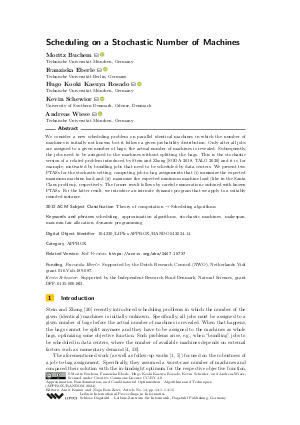Scheduling on a Stochastic Number of Machines
Authors
Moritz Buchem  ,
Franziska Eberle
,
Franziska Eberle  ,
Hugo Kooki Kasuya Rosado
,
Hugo Kooki Kasuya Rosado  ,
Kevin Schewior
,
Kevin Schewior  ,
Andreas Wiese
,
Andreas Wiese 
-
Part of:
Volume:
Approximation, Randomization, and Combinatorial Optimization. Algorithms and Techniques (APPROX/RANDOM 2024)
Part of: Series: Leibniz International Proceedings in Informatics (LIPIcs)
Part of: Conference: International Conference on Approximation Algorithms for Combinatorial Optimization Problems (APPROX)
Part of: Conference: International Conference on Randomization and Computation (RANDOM) - License:
 Creative Commons Attribution 4.0 International license
Creative Commons Attribution 4.0 International license
- Publication Date: 2024-09-16
File

PDF
LIPIcs.APPROX-RANDOM.2024.14.pdf
- Filesize: 0.76 MB
- 15 pages
Document Identifiers
Related Versions
- Full Version https://arxiv.org/abs/2407.15737
Subject Classification
ACM Subject Classification
- Theory of computation → Scheduling algorithms
Keywords
- scheduling
- approximation algorithms
- stochastic machines
- makespan
- max-min fair allocation
- dynamic programming
Metrics
- Access Statistics
-
Total Accesses (updated on a weekly basis)
0PDF Downloads0Metadata Views
Abstract
We consider a new scheduling problem on parallel identical machines in which the number of machines is initially not known, but it follows a given probability distribution. Only after all jobs are assigned to a given number of bags, the actual number of machines is revealed. Subsequently, the jobs need to be assigned to the machines without splitting the bags. This is the stochastic version of a related problem introduced by Stein and Zhong [SODA 2018, TALG 2020] and it is, for example, motivated by bundling jobs that need to be scheduled by data centers. We present two PTASs for the stochastic setting, computing job-to-bag assignments that (i) minimize the expected maximum machine load and (ii) maximize the expected minimum machine load (like in the Santa Claus problem), respectively. The former result follows by careful enumeration combined with known PTASs. For the latter result, we introduce an intricate dynamic program that we apply to a suitably rounded instance.
Cite As Get BibTex
Moritz Buchem, Franziska Eberle, Hugo Kooki Kasuya Rosado, Kevin Schewior, and Andreas Wiese. Scheduling on a Stochastic Number of Machines. In Approximation, Randomization, and Combinatorial Optimization. Algorithms and Techniques (APPROX/RANDOM 2024). Leibniz International Proceedings in Informatics (LIPIcs), Volume 317, pp. 14:1-14:15, Schloss Dagstuhl – Leibniz-Zentrum für Informatik (2024)
https://doi.org/10.4230/LIPIcs.APPROX/RANDOM.2024.14
BibTex
@InProceedings{buchem_et_al:LIPIcs.APPROX/RANDOM.2024.14,
author = {Buchem, Moritz and Eberle, Franziska and Kasuya Rosado, Hugo Kooki and Schewior, Kevin and Wiese, Andreas},
title = {{Scheduling on a Stochastic Number of Machines}},
booktitle = {Approximation, Randomization, and Combinatorial Optimization. Algorithms and Techniques (APPROX/RANDOM 2024)},
pages = {14:1--14:15},
series = {Leibniz International Proceedings in Informatics (LIPIcs)},
ISBN = {978-3-95977-348-5},
ISSN = {1868-8969},
year = {2024},
volume = {317},
editor = {Kumar, Amit and Ron-Zewi, Noga},
publisher = {Schloss Dagstuhl -- Leibniz-Zentrum f{\"u}r Informatik},
address = {Dagstuhl, Germany},
URL = {https://drops.dagstuhl.de/entities/document/10.4230/LIPIcs.APPROX/RANDOM.2024.14},
URN = {urn:nbn:de:0030-drops-210073},
doi = {10.4230/LIPIcs.APPROX/RANDOM.2024.14},
annote = {Keywords: scheduling, approximation algorithms, stochastic machines, makespan, max-min fair allocation, dynamic programming}
}
Author Details
Funding
- Eberle, Franziska: Supported by the Dutch Research Council (NWO), Netherlands Vidi grant 016.Vidi.189.087.
- Schewior, Kevin: Supported by the Independent Research Fund Denmark, Natural Sciences, grant DFF-0135-00018B.
References
-
Eric Balkanski, Tingting Ou, Clifford Stein, and Hao-Ting Wei. Scheduling with speed predictions. In International Workshop on Approximation and Online Algorithms (WAOA), pages 74-89, 2023.

-
Anindya De, Sanjeev Khanna, Huan Li, and Hesam Nikpey. An efficient PTAS for stochastic load balancing with poisson jobs. In International Colloquium on Automata, Languages, and Programming (ICALP), pages 37:1-37:18, 2020.

-
Florian Diedrich, Klaus Jansen, Ulrich M. Schwarz, and Denis Trystram. A survey on approximation algorithms for scheduling with machine unavailability. In Algorithmics of Large and Complex Networks, pages 50-64, 2009.

-
Franziska Eberle, Anupam Gupta, Nicole Megow, Benjamin Moseley, and Rudy Zhou. Configuration balancing for stochastic requests. In Integer Programming and Combinatorial Optimization (IPCO), pages 127-141, 2023.

-
Franziska Eberle, Ruben Hoeksma, Nicole Megow, Lukas Nölke, Kevin Schewior, and Bertrand Simon. Speed-robust scheduling: sand, bricks, and rocks. Math. Program., 197(2):1009-1048, 2023.

-
Leah Epstein and Rob van Stee. Maximizing the minimum load for selfish agents. Theor. Comput. Sci., 411(1):44-57, 2010.

-
Michael R. Garey and David S. Johnson. Complexity results for multiprocessor scheduling under resource constraints. SIAM J. Comput., 4(4):397-411, 1975.

-
Michael R. Garey and David S. Johnson. "Strong" NP-completeness results: Motivation, examples, and implications. J. ACM, 25(3):499-508, 1978.

-
Anupam Gupta, Amit Kumar, Viswanath Nagarajan, and Xiangkun Shen. Stochastic load balancing on unrelated machines. Math. Oper. Res., 46(1):115-133, 2021.

-
Anupam Gupta, Benjamin Moseley, and Rudy Zhou. Minimizing completion times for stochastic jobs via batched free times. In ACM-SIAM Symposium on Discrete Algorithms (SODA), pages 1905-1930, 2023.

-
Dorit S. Hochbaum and David B. Shmoys. Using dual approximation algorithms for scheduling problems theoretical and practical results. J. ACM, 34(1):144-162, 1987.

- Dorit S. Hochbaum and David B. Shmoys. A polynomial approximation scheme for scheduling on uniform processors: Using the dual approximation approach. SIAM J. Comput., 17(3):539-551, 1988. URL: https://doi.org/10.1137/0217033.
-
Sharat Ibrahimpur and Chaitanya Swamy. Minimum-norm load balancing is (almost) as easy as minimizing makespan. In International Colloquium on Automata, Languages, and Programming (ICALP), pages 81:1-81:20, 2021.

-
Sungjin Im, Benjamin Moseley, and Kirk Pruhs. Stochastic scheduling of heavy-tailed jobs. In Symposium on Theoretical Aspects of Computer Science (STACS), pages 474-486, 2015.

-
Jon M. Kleinberg, Yuval Rabani, and Éva Tardos. Allocating bandwidth for bursty connections. SIAM J. Comput., 30(1):191-217, 2000.

-
Sartaj K. Sahni. Algorithms for scheduling independent tasks. J. ACM, 23(1):116-127, 1976.

-
Jay Sethuraman. Stochastic scheduling. In Encyclopedia of Algorithms, pages 2110-2113. Springer, 2016.

-
Martin Skutella, Maxim Sviridenko, and Marc Uetz. Unrelated machine scheduling with stochastic processing times. Math. Oper. Res., 41(3):851-864, 2016.

-
Wolfgang Stadje. Selecting jobs for scheduling on a machine subject to failure. Discret. Appl. Math., 63(3):257-265, 1995.

-
Clifford Stein and Mingxian Zhong. Scheduling when you do not know the number of machines. ACM Trans. Algorithms, 16(1):9:1-9:20, 2020.

-
Gerhard J. Woeginger. A polynomial-time approximation scheme for maximizing the minimum machine completion time. Oper. Res. Lett., 20(4):149-154, 1997.

